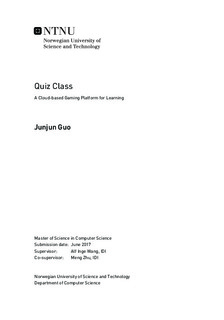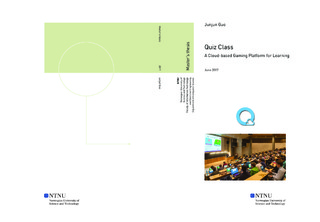| dc.description.abstract | Digital games are very popular today and people spend a lot of time playing. Because it is fun and enjoyable to play, people get engaged and motivated while playing and would love to play more. The key to effective learning is to be engaged and motivated. But in traditional learning, it is usually hard to get learners engaged and motivated. What if we can introduce an engaging and innovative game concept into learning? What if some of the time people spend on playing digital games is used on learning? What if learning is just as engaging and motivating as playing?
The aim of this study is to investigate: how a game concept can be used in doing homework/assignments; how such an application can be designed, implemented with today s technology; how the game-based learning software (Quiz Class) can be easily accessed, and how Quiz Class can influence students learning motivation.
This project includes three parts. The first part studies the relevant research, applications, technologies, and develop a game-based learning concept, design a software architecture that combines gameplay, learning, and social interactions into an application. The second part implements a digital game-based learning application (Quiz Class), deploy Quiz Class in the cloud, test it on end-uses, and improve it. The third part finds real classes, test, collect data and investigate how Quiz Class can influence students learning motivation.
Finally, a game-based learning concept and a software architecture have been designed, Quiz Class has been implemented and tested. Quiz Class had 173 registered participants from a preliminary test and final test. The preliminary test had participants as groups and individuals. The final test was taking place in the software architecture course at NTNU, with 116 participants and 78 valid questionnaire responses. Multiple sources including interviews, observations, survey were used to collect data.
The Quiz Class testing results showed that game-based learning application can be designed, implemented, and easily accessed. A game concept can be used in learning, and bringing a digital game into learning can boost learners motivation, engagement, and make learning fun. In addition, between 29% to 41% of students did the assignments again to improve themselves. Some students even repeated the assignment 9 times to make progress, and yet all the assignments were optional. At last, Quiz Class analysis tools for teachers were viewed helpful to improve teaching efficiency. | |

